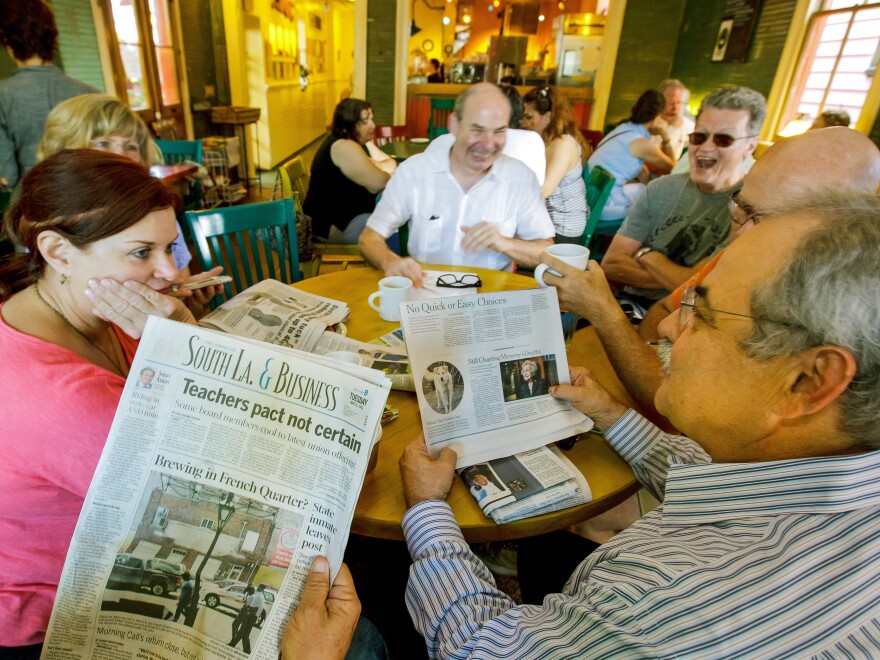Last year when New Orleans' main paper, The Times-Picayune, laid off dozens of newspaper employees and cut its circulation to three times a week, residents were shocked.
Sharron Morrow and her friends had bonded over the morning paper at a local coffee shop for the past 20 years.
"I've stopped my subscription, and I mourn the paper almost every day," she says.
Shifting Media Players
Newspaper circulation has been rapidly declining all over the country. Advertising revenue has plummeted while online revenue has been making small gains. The Times-Picayune re-branded itself as The Times-Picayune NOLA.com, representative of its new Web-centered focus.
Multimillionaire John Georges was one of the local movers and shakers furious at The Times-Picayune's changes. He was also upset that the paper's New York-based owners, the Newhouse family, refused to sell it.
When The Times-Picayuneannounced it would scale back its print edition, Baton Rouge newspaper The Advocate launched a daily New Orleans edition to compete. Georges bought The Advocate this year, with an aim toward expanding the paper's New Orleans coverage and luring more subscribers from The Times-Picayune.
"We fought the Battle of New Orleans once before; some think we are going to fight it again in the newspaper," he says.
To lead the charge, Georges hired Dan Shea, a managing editor laid off from The Times-Picayune during cutbacks. In the weeks since his hiring, a slew of prize-winning reporters have jumped from The Times-Picayune to The Advocate. Shea says subscriptions in New Orleans are growing.

"The notion of going into another newspaper's market and convincing their readers to read yours is a fool's errand — except when you so break the bonds of your brand with your readers, and it's created this once-in-a-lifetime opportunity," he says.
Media Weapons
On one side, The Advocate has a brand new printing press strategically placed between New Orleans and Baton Rouge.
On the other side, The Times-Picayune has an aggressive media strategy. The company recently mounted a new daily Web series about the Saints, the local NFL team.
The company has also launched a daily tabloid available exclusively on newsstands on the days the newspaper does not circulate.
Editor Jim Amoss says that despite what the city's size might suggest, there is a big appetite for local news. He's confident that between the tabloid and the Web presence, The Times-Picayune will cater to the town's obsession with itself and its image.
"We're that hometown newspaper and by far the largest newsgathering force, and I don't say that boastingly — that is just a fact," he says. "We'll see what the competition brings."
Picking Sides
Still, consumers feel like they are caught in the middle.
Wilbert "Chill" Wilson owns a barber shop in town. He is keeping his Times-Picayune subscription but is disappointed that there is no Monday paper. He says The Advocate does not feel local.
"Nobody has done a great job yet that is fulfilling to the community in New Orleans," he says.
At a local coffee shop, Sue Rapaski agrees.
"Reading The Advocate is like reading a high school paper; I really hate it," she says.
Her friend Sharron Morrow is more optimistic. "It's getting better as they get to know our needs, and hopefully they'll have a big presence down here."
Copyright 2020 WWNO - New Orleans Public Radio. To see more, visit WWNO - New Orleans Public Radio.


